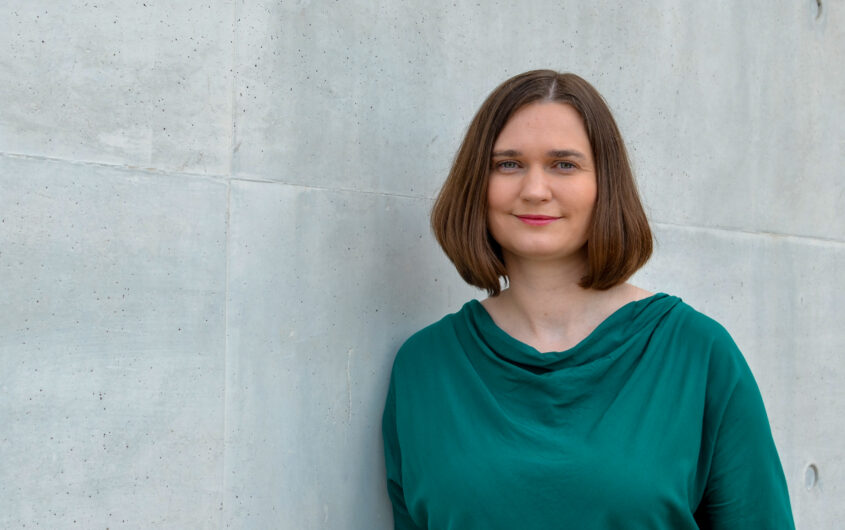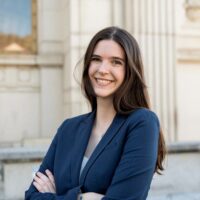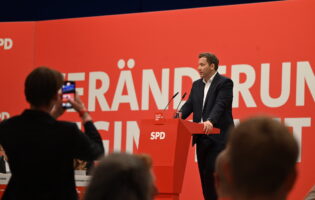
AGI Profiles: Claudia Müller

Emma Levi
Halle Foundation/AGI Intern
Emma Levi is a research intern at AGI for the summer of 2023. She provides research support to AGI’s programs, monitors the media, and assists with AGI’s programs, events, and databases.
Emma is currently pursuing a bachelor’s degree in Political Science and German from the University of California, Berkeley. She is passionate about transatlantic exchange and dialogue, specifically between the EU and the United States. Emma has completed coursework on topics such as European identity and democracy, as well as German history and politics. Previously, she studied abroad at the Humboldt University in Berlin in Summer 2022. At Berkeley, Emma is a research assistant for the Institute of European Studies and has held previous internships for both European startups and nonprofits.
Parliamentary State Secretary in the Federal Ministry of Food and Agriculture
Claudia Müller is currently serving as the Parliamentary State Secretary for Food and Agriculture in the coalition government of Olaf Scholz. The role of the Parliamentary State Secretary is to help the Federal Minister manage their responsibilities, whether this be maintaining good relations with the various committees of the Bundestag and Bundesrat or coordinating parliamentary groups and task forces. Müller was appointed in January 2023 following the resignation of Dr. Manuela Rottmann from the position, who left to run as the Green candidate in the 2023 Frankfurt mayoral election. Since 2009, Müller has been politically active at the local level, representing her home state of Mecklenburg-West Pomerania in various capacities before she was elected to the Bundestag in 2017. Upon news of Müller’s new role, Federal Minister Cem Özdemir stated that he is “very pleased” with the selection of Dr. Rottmann’s successor and especially admires her “firm eye on the strengths and concerns of rural areas” and close connection to the sea, coast, and fisheries. In Özdemir’s statement, he commends the former State Secretary Rottmann for her contributions to the Federal Ministry of Agriculture the preceding year, indicating a seamless and amicable transition of authority.
Background
Claudia Müller was born in Rostock, Germany’s biggest Baltic port city. She completed her Abitur at the Gymnasium am Goetheplatz in Rostock in 2002, with an exchange year to the United States in 1998-1999. Müller then studied International Business at the University of Applied Sciences in Stralsund from 2002 to 2007. After university, she was involved in freelance tourism work before developing an interest in local politics in 2009. She was state chair of the Green party in Mecklenburg-West Pomerania from 2012 to 2017 and has been a member of the Bundestag since 2017. She has previously been a member of the Committee on European Affairs and the Committee on Economic Affairs. During coalition talks after the 2021 Bundestag election, she represented her party in the economic affairs working group co-chaired by Cem Özdemir.
The Baltic Sea
Since becoming a member of the Bundestag, Müller has been a consistent advocate for the well-being of Germany’s maritime economy. Her strong ties to Mecklenburg-West Pomerania incentivized her to join several “parliamentary friendship” groups with other countries and regions that border the Baltic Sea. These groups help maintain close contact and open dialogue with other Baltic states. Additionally, Müller is a member of the Baltic Sea Parliamentary Conference (BSPC). This conference serves as a unifying platform for regional and national parliaments situated around the Baltic Sea region and is intended to raise awareness about issues of relevance to the region. Müller’s demonstrated passion for economic affairs as Parliamentary State Secretary is also demonstrated in the work she does for the BSPC. In recent years, the conference has focused specifically on environmental sustainability and economic development.
With Germany assuming the presidency of the conference for the 2022-2023 period and hosting the annual meeting of the BSPC, the stage is set for Germany to play a significant role in shaping the conference’s goals. However, Russia’s withdrawal from the organization amidst the war with Ukraine has injected a sense of uncertainty into the upcoming conference. Germany’s leadership will therefore play a crucial role in guiding the BSPC and setting its priorities, thereby charting a path forward for the organization. Against the background of the Ukraine war, president of the BSPC Johannes Schraps notes that the main priorities of the conference will be to strengthen “the resilience of democracies […], especially resilience in the digital space” through better “cooperation, partnership, and reliability.” Schraps is adamant that the stability of the Baltic region “cannot be taken for granted.” Müller will likely assume a significant role in these discussions, with a particular emphasis on harnessing Mecklenburg’s potential to enhance maritime resilience in the region.
Energy and the Nord Stream 2 Pipeline
The Nord Stream 2 Pipeline, a natural gas pipeline running from Russia to Germany via the Baltic Sea, has been swept by controversy since its inception. After U.S. sanctions were imposed on the project, the Mecklenburg-West Pomeranian government led by Manuela Schwesig set up a Climate Foundation to head the project. While the stated purpose of the foundation is to encourage conservation projects, it has been widely criticized for attempting to circumvent U.S. sanctions and having close ties to the “Nord Stream AG” subsidiary of Russian Gazprom. Ultimately, the foundation contributed over 165 million euros to the project. While construction of the pipeline was completed, the certification was canceled due to the Russian invasion of Ukraine.
Müller has been adamantly against the Nord Stream 2 pipeline’s construction since its inception. In 2020, she accused Minister-President Schwesig of “putting themselves in the service of a Russian company based in Switzerland” instead of acting in the interests of Schwesig’s own federal state. More recently, Müller has argued that the CDU is also to blame for allowing the approval of the Climate Foundation within twenty-four hours and continuously pushing the project forward. She notes that they, too, have been “harnessed by Russian propaganda.” Müller is especially concerned about the environmental impacts of the project as well as its potential to strain gas customers in the Mecklenburg-West Pomerania region. She believes that viewing fossil fuels as a bridge technology is “simply wrong” and that the jobs created by the pipeline “hardly matter” when balanced with its detrimental environmental impact. Instead, she suggests investing in jobs within the renewable energy sector. Her platforms for the 2022 Rostock mayoral race included a mission for the Mecklenburg-West Pomerania region to become “one of the largest economic locations for renewable energies and hydrogen production.”
Other Interests
Claudia Müller’s engagements are not limited to the Baltic Sea. She also maintains a strong social media presence, which she leverages to connect with her constituency. She films “day in the life” videos that provide insights into her work and offer advice on how to be more environmentally conscious at home. As an advocate for EU engagement in the Mecklenburg region, Müller believes that the influence of the European Union extends far beyond the confines of Strasbourg and Brussels: “Ganz klar: EU ist weit mehr als Straßburg und Brüssel.” She emphasizes that numerous European projects, such as the Common Agricultural Policy, have a direct impact on the daily lives of people in the region. Müller’s positive stance towards the European Union is coupled with a progressive approach to immigration. This policy is aimed at fostering an inflow of skilled labor into Mecklenburg-West Pomerania. According to Müller, the shortage of specialists is a big challenge for the region, with 43.7 percent of all vacancies lacking sufficiently qualified applicants. As a solution, she strongly supports the implementation of an “opportunity card,” or “Chancenkarte,” which allows people to come to Germany to look for a job providing they have the required minimum of points. She hopes that the Skilled Immigration Act will allow the region to drive sustainable development, writing that “there would be no new solar systems without an installer, no sustainable mobility without a bus driver.”









